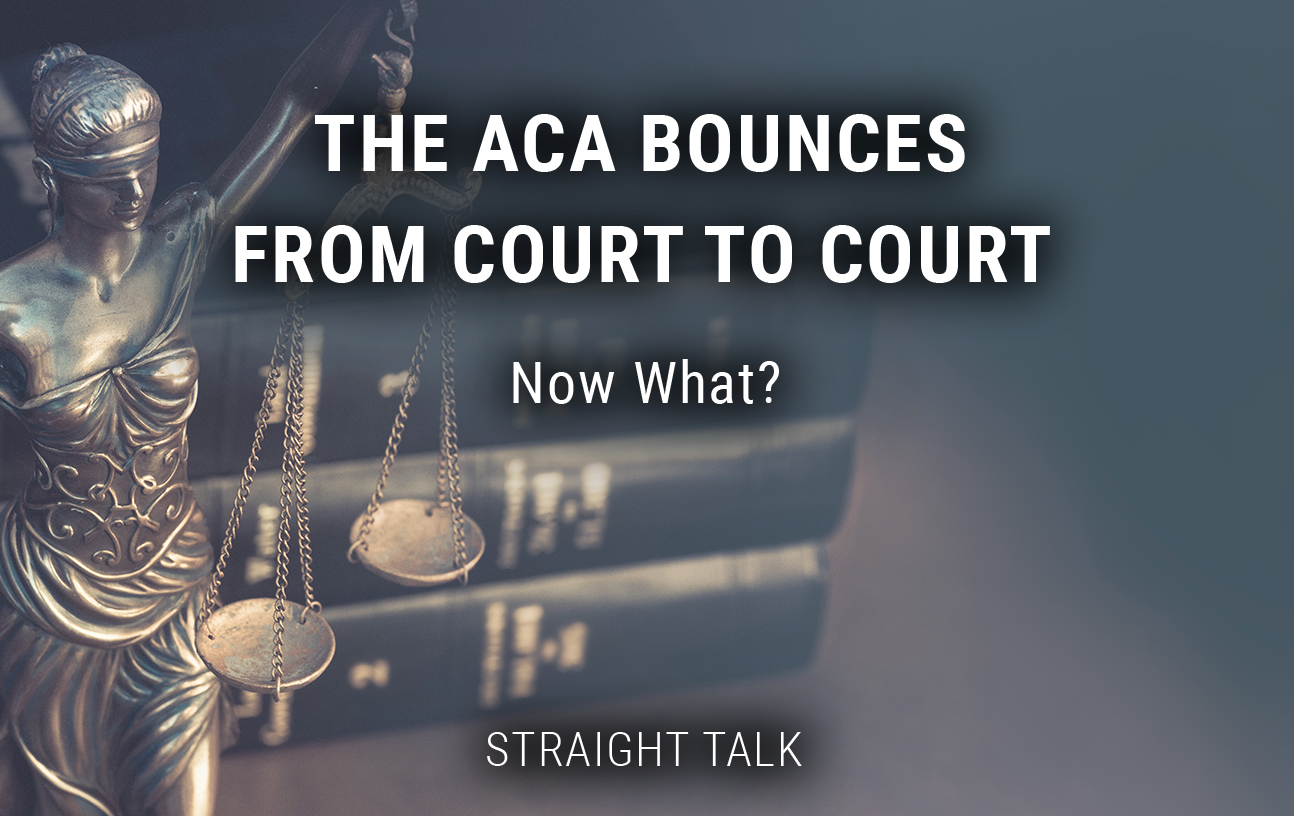You ever hear the expression “You just can’t make this stuff up?” It implies that reality is so bizarre, so unexpected, that it HAS to be unscripted and random.
If you’ve followed the fate of the Affordable Care Act through the courts over the past decade, you would become a believer of “you just can’t make this stuff up.”
A Quick Review.
The ACA was signed into law in 2010, and almost immediately set off court battles. In 2012, the Supreme Court of the United States, in a case called NFIB v. Sebelius (National Federation of Independent Businesses versus then- federal health Secretary Kathleen Sebelius), decided this: Of three possible ways the Affordable Care Act could remain within the limits of the Constitution, only ONE applied.
They said the individual mandate, a rule in the ACA that required most U.S. citizens to purchase health insurance or pay money to the federal treasury, was OK to enforce as long as everybody understood that it was a TAX. Congress can tax basically anything it wants. It was not a fine or a fee or a payment; the money you had to pay when you failed to buy health insurance was a TAX.
Everybody got that? Good! Cause it’s going to be very important in a minute.
A Big Change in 2017
In 2017, after the ACA had been cruising along pretty well for three years, and people who failed to buy insurance were paying the tax, Congress passed a bill called the Tax Cuts and Jobs Act. Among many other things it did, this Act reduced the individual mandate penalty to $0. The mandate was still in the law, but technically unenforceable since nobody had to pay the tax.
A big group of 20 state Attorneys General who were opposed to the ACA filed suit in 2018, claiming a few things:
- If a tax doesn’t collect any revenue for the federal treasury, it’s no longer a tax.
- If the individual mandate is no longer a tax, then the 2012 Supreme Court decision no longer applies, and the mandate is NOT allowed within the Constitution; and
- Without the mandate, the entire ACA must fall.
The ACA Goes to Court, Again
In December 2018, Texas District Court Judge Reed O’Connor agreed with the state AGs and invalidated the entire ACA! BUT — he agreed not to enforce his decision until after all the appeals had been run through.
The Democrats in Congress, and 16 OTHER state Attorneys General, immediately appealed his ruling to the Fifth U.S. Circuit Court of Appeals in New Orleans. On Dec. 18, 2019, the Fifth Circuit issued their ruling, and it is VERY interesting.
Well, What Does the Ruling Say?
First of all, the Fifth Circuit agreed with the first two points of the original AGs’ lawsuit above – that without revenue coming in, the individual mandate was no longer a tax.
But, they TOTALLY disagreed with their third point. In fact, if you read their decision (all 98 pages of it!) like I have, you come away believing the appeals court was not at all impressed with the work of the Texas district court on the argument that the whole ACA must fall without the mandate. They asked some really important questions:
- The ACA has 10 distinct sections that all do different things. Some of them seem to have nothing to do with the individual mandate, nor do they seem to interact with the individual mandate. Why would those things have to fall?
- For example, the ACA allows dependents to stay on their parents’ insurance until age 26. What does THAT have to do with the individual mandate?
- The ACA sets out definitions for which benefits and services health insurance has to cover for individual and small group policies. It creates and funds a federal agency to constantly study wellness benefits to determine which ones are vital. How do any of these things interact with the individual mandate?
- The ACA creates and funds a very large Medicaid expansion. In Louisiana alone, more than 450,000 people have gotten health insurance because of this expansion. How does the individual mandate affect that?
So, in December, the Fifth Circuit Court sent the case BACK to the Texas district court and ordered it to analyze every single section of the ACA, in detail. The Texas court will have to determine which parts of the ACA the individual mandate actually affects. This could potentially take quite some time. And, the final ruling could still be appealed.
So, What Happens Right Now?
Meanwhile, the people defending the ACA (the other group of AGs and Congressional Democrats) appear to have run out of patience with the legal process and are trying to jump the Fifth Circuit case directly to the Supreme Court. They requested a speedy hearing on whether the individual mandate remains constitutional even without being a tax.
Note – the Supreme Court is NOT going to analyze each section of the ACA to try and figure out which parts work with or without a mandate. The ACA supporters in the case are simply trying to get a final “Yes or No” on the mandate question and reduce uncertainty, for their own reasons, some of which are surely political (it’s an election year, don’t you know?).
Whew!
So, that’s where we are now. I think it’s likely the Supremes will agree to a speedy hearing on just the mandate issue and issue an opinion by May or June of this year.
Straight Talk is, I don’t expect the ultimate court decision to take health insurance away from the 30 million+ people who have it strictly because of the ACA. I also don’t expect Louisiana to lose the $3 billion a year in Medicaid and individual health insurance payments we are currently getting from Washington, D.C. because of this case. Certainly not anytime soon. In a future blog, I’m going to share examples of some things states are doing to keep the mandate and other parts of the ACA in place for their residents.
I DO expect more legal maneuvering, posturing, noise and confusion. Stay tuned, and I’ll be happy to sort it all out for you!





Let’s say The ACA falls and is no longer the law of the land , then what?
Do we go back to pre 20101 regulations? Will the whole Health Insurance Industry be held in “limbo” ? If you have addressed this before please accept my apologies as I have obviously missed it.
So far Straight Talk gets a a resounding Harumph for the excellent work to this point!!!!
Michael! Great to hear from you!
No way to know for sure what happens if the ACA disappears, but it would cost Louisiana about $3 Billion in lost federal funding. That’s a big hit right there (to our phoney baloney jobs!). Thanks for the “Harumph!”. Have a great 2020!….mrb